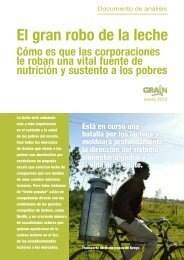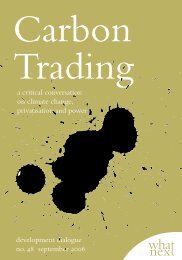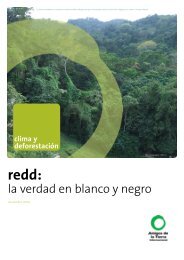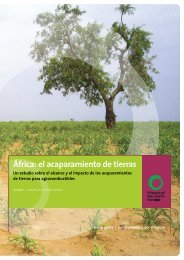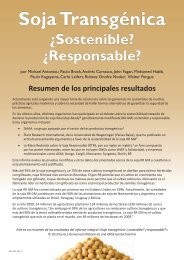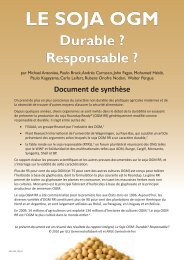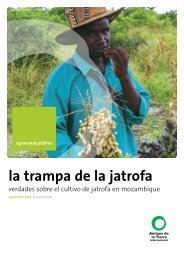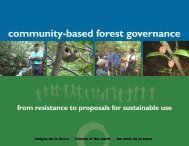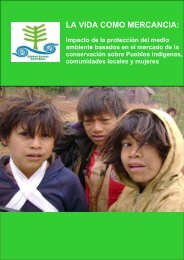Plantations, poverty and power - Critical Information Collective
Plantations, poverty and power - Critical Information Collective
Plantations, poverty and power - Critical Information Collective
You also want an ePaper? Increase the reach of your titles
YUMPU automatically turns print PDFs into web optimized ePapers that Google loves.
130<br />
The final sentence of Criterion 10.4 confirms that the pulp company need not worry about its eucalyptus<br />
monocultures: “Exotic species, which shall be used only when their performance is greater than that of<br />
native species, shall be carefully monitored to detect unusual mortality, disease, or insect outbreaks <strong>and</strong><br />
adverse ecological impacts.” Pulp companies plant exotic eucalyptus trees precisely because their<br />
performance is better for pulp production (or at least better researched) than native species. Eucalyptus<br />
pulp comm<strong>and</strong>s a higher price on the world market than pulp manufactured from native forests. Little is<br />
known about the growth rates of many of, say, Brazil’s tree species, <strong>and</strong> even less is known about their<br />
qualities for producing pulp. Monitoring for “unusual mortality, disease, or insect outbreaks” is businessas-usual<br />
for any company that has invested millions of dollars in an exotic monoculture plantation.<br />
Monitoring for “adverse ecological impacts” is another matter. Replacing a natural ecosystem with a<br />
monoculture of thous<strong>and</strong>s of hectares of exotic species is in itself an “adverse ecological impact”. The<br />
problem is that the impacts, such as reduced water supply as the monocultures suck streams <strong>and</strong> ponds<br />
dry, is felt by local communities <strong>and</strong> not by the scientists that the company employs to monitor its<br />
plantations. When FSC’s certifying bodies visit the plantations they listen to the company’s scientists<br />
rather than the local communities.<br />
Criterion 10.5 is hopelessly vague: “A proportion of the overall forest management area, appropriate to<br />
the scale of the plantation <strong>and</strong> to be determined in regional st<strong>and</strong>ards, shall be managed so as to restore<br />
the site to a natural forest cover.” Once again this leads to a string of questions. What percentage of the<br />
management area shall be restored to forest Is one per cent sufficient Or 10 per cent Or 50 per cent<br />
What if the area never had forest cover, in countries such as Uruguay, Argentina or South Africa, where<br />
large areas of plantations have been FSC-certified<br />
Criterion 10.6, if applied consistently, would exclude all large scale, fast growth, exotic tree plantations<br />
from FSC certification. It states that<br />
“Measures shall be taken to maintain or improve soil structure, fertility, <strong>and</strong> biological activity. The<br />
techniques <strong>and</strong> rate of harvesting, road <strong>and</strong> trail construction <strong>and</strong> maintenance, <strong>and</strong> the choice of species<br />
shall not result in long-term soil degradation or adverse impacts on water quality, quantity or substantial<br />
deviation from stream course drainage patterns.”<br />
Yet FSC has certified large scale plantations with serious impacts on soil structure, fertility, biological<br />
activity <strong>and</strong> water. FSC-certified plantations in South Africa, Brazil, Chile <strong>and</strong> Uruguay are harvested in<br />
large clearcuts, leaving the soil exposed.<br />
Criterion 10.7 states that “Measures shall be taken to prevent <strong>and</strong> minimize outbreaks of pests, diseases,<br />
fire <strong>and</strong> invasive plant introductions.” FSC does not specify the measures that companies are supposed to<br />
take. Year after year, thous<strong>and</strong>s of hectares of FSC-certified plantations in South Africa burn. FSCcertified<br />
companies kill baboons, which have become a pest in plantations. 641 Obviously this slaughter<br />
has an impact on local biodiversity. Meanwhile the plantation companies’ exotic trees have turned into<br />
invasive species in native ecosystems. None of the plantation companies have lost their FSC certificates<br />
as a result.<br />
641 “Wildlife slaughter <strong>and</strong> fires take corporate gloss off FSC General Assembly”, FSC-Watch, 4 September 2008.<br />
http://www.fsc-watch.org/archives/2008/09/04/Wildlife_slaughter_a



